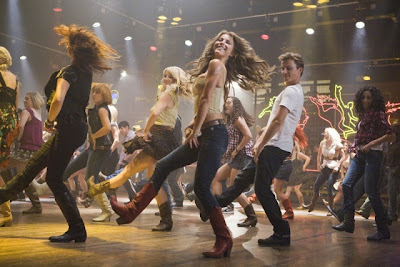Director: Doug Liman
Starring: Jake Gyllenhaal, Daniela Melchior, Conor McGregor, Billy Magnussen, Jessica Williams, B.K. Cannon, Joaquim de Almeida, Austin Post, Lukas Gage, JD Pardo, Hannah Lanier, Kevin Carroll, Darren Barnet, Travis Van Winkle
Running Time: 121 min.
Rating: R
★★★ (out of ★★★★)
Whenever a cult classic is reimagined with modern sensibilities, response among devoted fans tends to be harsh, as so much of their appreciation stems from their memories watching it. Regardless of actual quality, 1989's Road House firmly fits in that category, where the viewing experience itself supersedes any perceived flaws, serving to make the inevitable remake that much harder to crack. Luckily, director Doug Liman understands this, or maybe more importantly, the original's place within the cheesy 80's action movie pantheon.
To that end, this rebooted Road House is everything it should be, delivering the kind of trashy, over-the-top fun we don't get nearly enough of in the genre. You can actually understand why Liman's upset this skipped theaters and went straight to streaming since there's good reason to believe it could have been a big commercial hit. With the exception of some occasionally distracting CGI and a video game aesthetic, it's ridiculously fun, exciting entertainment that blazes its own trail, alleviating any concerns this remake would damage nostalgic feelings for its predecessor.
When former UFC middleweight fighter Elwood Dalton (Jake Gyllenhaal) is asked by business owner Frankie (Jessica Williams) to work as a head bouncer at her Florida Keys roadhouse, he initially rejects the offer. It's only after a botched suicide attempt that he reluctantly agrees, arriving in Glass Key to the appropriately named bar, "The Road House." Overrun with gangs and nightly brawls, the seemingly mild-mannered Dalton tries to keep the peace, until realizing he'll need to get his hands dirty, delivering a brutal beatdown that sends a group of biker thugs to the E.R.
At the hospital, he meets Ellie (Daniela Melchior), a doctor who warns him just how deep the violence and corruption runs in this coastal community. So it isn't long before Dalton finds himself being hunted by yuppie crime boss Ben Brandt (Billy Magnussen) and his incarcerated father's psychotic enforcer Knox (Conor McGregor). As they look to add Frankie's bar to Brandt's criminal property portfolio, Dalton remains haunted by a traumatic event in his past. Pushed to the limit, he'll have to decide whether to skip town or stay and fight, despite the danger it could mean for him and everyone else.
At one point, a member of the gang describes Dalton as having the disposition of Mister Rogers, which does accurately sum up Gyllenhaal's zen-like take on a character that's very far removed from its original incarnation. Overtly alluding to classic Westerns in both dialogue and setup, this lone drifter unassumingly rolls in and surveys his new surroundings, striking up a friendship with precocious teen Charlie (Hannah Lanier) who co-runs a small bookstore with her dad Stephen (Kevin Carroll).
The opening hour is terrific, as Liman immerses us in the local color of Glass Key, or more specifically The Road House itself, which would come across as a fun place to hang if brutal fights didn't spontaneously erupt every two minutes. Dalton never really loses his cool, at least not exactly, remaining calm and polite even when he's pushed, transforming into this ass-kicking machine only when necessary. And even then, he doesn't take a whole lot of pride in doing it.
Liman's biggest coup is his casting of Gyllenhaal, who has the unenviable task of stepping into his
late Donnie Darko co-star Patrick Swayze's iconic role. On paper, it's an odd fit, but the actor responds with a quirky and menacing turn that fits the material
like a glove, arguably giving his most absorbing performance since Nightcrawler. Through a few nightmarish flashbacks, we already have an idea why Dalton's carrying all this guilt and emotional
baggage. The anticipation is in waiting for the moment he has
enough and finally snaps, unleashing the dark side of himself he's struggled to suppress.
Given how physically dominant Dalton is, he's more likely pass as a full fledged superhero than MMA competitor, but no one's going into this expecting strict realism. We're too busy marveling at the action sequences, along with Garrett Warren and Steve Brown's jaw dropping stunt/fight choreography. If forced to draw comparisons, the whole thing has a relentless energy that may remind some of the Crank films, only with more narrative meat on its bones and superior performances.
Magnussen makes for a sleazy antagonist, but from the minute he memorably enters, Conor McGregor's sadistically unhinged lunatic steals the show, delivering exactly the kind of crazed, hilarious performance you hoped for, constantly blurring lines between the character and real life fighter playing him. Even the romantic subplot between Dalton and Melchior's Ellie works better than it should once it's clear her involvement isn't merely tangential. Dalton's scenes with bar owner Frankie are just as effective, with Williams's presence grounding even the looniest developments.
In the last act, Liman steps on the gas and doesn't let up, delivering a spectacular boat chase sequence and final showdown between Dalton and Knox that's best seen to be believed. Hardly trying to recreate Rowdy Herrington's original, this Road House is able to stand by itself, summoning a similar spirit, but with an entirely new setting and characters. And by not holding back or pretending to be more than it is, we get a fast food meal of a movie that offers no apologies for its bombastic approach.


















